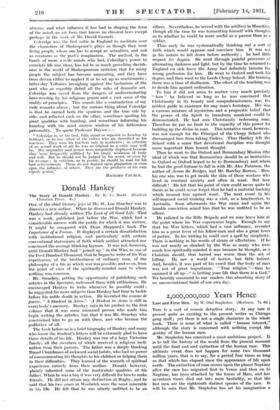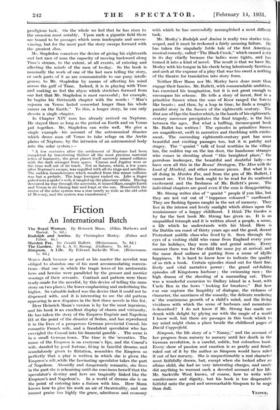2,000,000,000 Years Hence
Last and First Men. By W. Olaf Stapledon. (Methuen. 7s. 6d.)
THIS is a sort of cosmic detective story. At any rate it proved quite as exciting to the present writer as Chicago gang stuff ; yet there is not a single character in the whole book. There is none of what is called " human interest," although the story is concerned with nothing except the destiny of the human race.
Mr. Stapledon has conceived a most ambitious project. It is to tell the history of the world from the present moment until the final end and extinction of the human race. This ultimate 'event does not happen for some two thousand million years, that is to say, for a period four times as long as that which has elapsed since the appearance of life upon earth. The extinction of man occurs upon the planet Neptune after the race has migrated first to Venus and then on to Neptune, has been attacked by the forces of Mars, and has seventeen times died out into mere bestiality, so that the last men are the eighteenth-.distinct species of the- race. It will be seen that Mr. Stapledon has set his imagination a prodigious task. On the whole we feel that he has risen to the occasion most notably. Upon such a gigantic field there are bound to be passages which seem inadequate and uncon-
vincing, but for the most part the story sweeps forward with the greatest elan.
Mr. Stapledon conceives the device of giving his eighteenth 'and last race of man the capacity of moving backward along Time's stream, to the extent, at all events, of entering and affecting the minds of the men of to-day. So the book is nominally the work of one of the last men telling the story, or such parts of it as are communicable to our puny intelli- gences, to Mr. Stapledon by means of affecting his mind across the gulf of Time. Indeed, it is in playing with Time and making us feel the abyss which stretches forward from our feet that Mr. Stapledon is most successful ; for example, he begins his thirteenth chapter with the words : " Man's sojourn on Venus lasted somewhat longer than his whole ;career on the Earth." To this, a longer story, he can only
xlevote a single chapter.
In Chapter XIV man has already arrived on Neptune.
He stayed there as long as the period on Earth and on Venus put together. Mr. Stapledon can write well. We give a single example—his account of the astronomical disaster which drove man off Venus to take refuge on the Arctic .plains of Neptune, by the intrusion of an astronomical body into the solar system
" A few centuries after the settlement of Neptune had been 'completed by transferring thither all the most precious material 'relies of humanity, the great planet itself narrowly missed collision :with the dark stranger from space. Uranus and Jupiter were at the time well out of its track. Not so Saturn, which, a few years 'after Neptune's escape, was engulfed with all its rings and satellites. The sudden incandescence which resulted from this minor collision was but a prelude. The huge foreigner rushed on. Like a finger poked into a spider's web, it tangled up the planetary orbits. Having devoured its way through the asteroids, it missedMars,caughtEarth and Venus in its blazing hair and leapt at the sun. Henceforth the Centro of the solar system was a star nearly as wide as the old orbit of Mercury, and the system was transformed."
















































 Previous page
Previous page